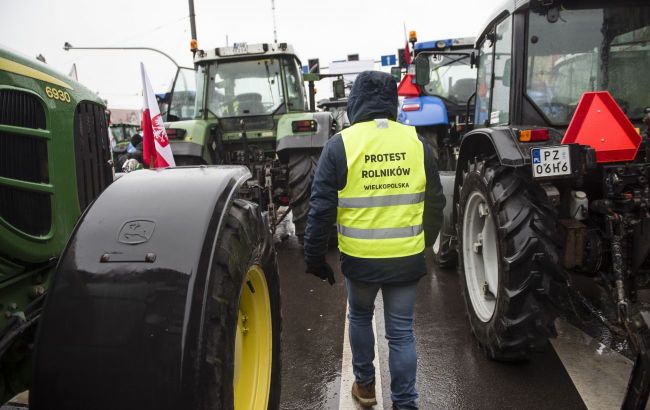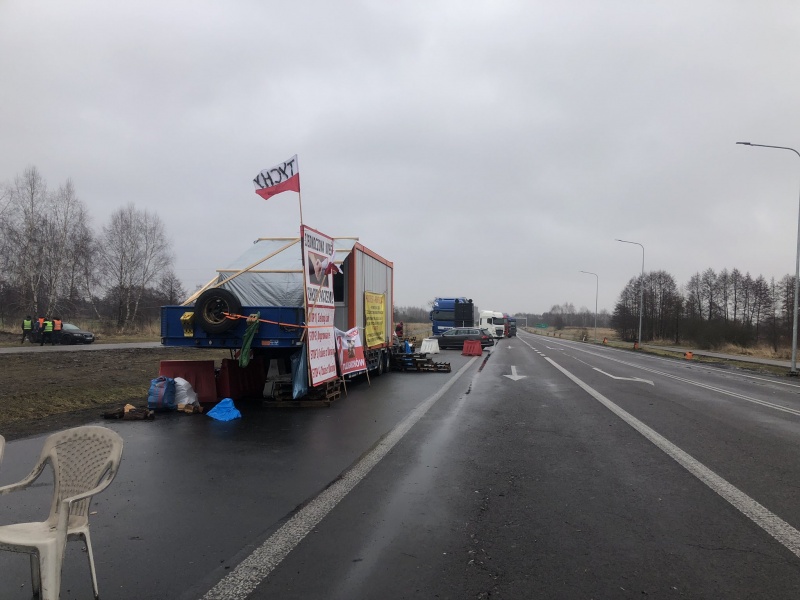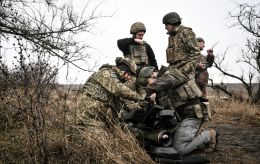Poles reinforce border blockade and spill Ukrainian grain: Latest
 Photo: Polish farmers reinforce the blockade on the border with Ukraine (Getty Images)
Photo: Polish farmers reinforce the blockade on the border with Ukraine (Getty Images)
Starting today, Polish farmers want to completely block all checkpoints with Ukraine for a month, as well as communication hubs and entrances to transshipment railroad stations and seaports. Currently, there is no total blockade, but Poles have already intensified their protests at previously blocked checkpoints, and Ukrainian grain has been scattered on the railroad.
Sources used: State Border Guard Service Andrii Demchenko, the Ministry of Foreign Affairs of Ukraine, Minister of Development of Poland Krzysztof Hetman, Minister of Agriculture and Rural Development of Poland Czeslaw Sekerski, Deputy Minister of Development of Communities, Territories and Infrastructure Serhii Derkach, Ukrinform, Suspilne, and Polish media.
Updated at 2:12 p.m. Polish farmers want to block the border until April
This was stated by Roman Kondrów, the leader of the organization of farmers Podkarpackie Deceived Village, which is blocking the Medyka-Shehyni checkpoint.
According to him, Polish farmers plan to continue their protest on the border with Ukraine for another month - until April - and do not rule out that they will start blocking passenger traffic, including buses.
Updated 1:46 p.m. Ukrainian carriers respond with a protest on the border with Poland
Today, Ukrainian carriers have launched a peaceful protest in response to the blockade of checkpoints by Polish protesters. The media published footage from the Krakivets-Korchova checkpoint.
In general, Ukrainians staged actions near the Rava-Ruska-Hrebenne, Krakivets-Korchova, and Shehyni-Medyka checkpoints.
Updated at 1:27 p.m. The State Border Guard Service of Ukraine reported that Polish strikers have started to restrict the movement of vehicles on the border with Ukraine, namely:
- Medyka-Shehyni. Polish farmers completely blocked the movement of trucks through the checkpoint. The end date of this blockade was not announced.
- Dolhobychuv-Uhryniv. Protesters plan to block traffic for all types of vehicles near the checkpoint until 17:00 on February 20.
- Zosin-Ustyluh. From 1 p.m. to 4 p.m., the protesters intend to restrict the movement of buses, trucks, and cars in both directions. They promise to let only trucks with humanitarian aid through.
- Korchova-Krakivets. Until 9 p.m. on February 20, protesters plan to block the movement of trucks leaving Poland, except for those carrying critical cargo. At the same time, buses, minibusses, and cars will be able to move freely in both directions.
- Hrebenne-Rava-Ruska. Since 1 p.m. on February 20, protesters have completely blocked traffic in both directions for all categories of vehicles, except for those carrying critical cargo and humanitarian aid.
- Dorohusk-Yahodyn. By 7 p.m., the protest organizers intend to completely block truck traffic in both directions.
Situation at Poland-Ukraine border
As of this morning, Polish border guards have not yet received any information about the start of blocking other checkpoints, according to State Border Guard Service of Ukraine spokesperson Andrii Demchenko.
That is, the following checkpoints remain blocked: Yahodyn, Ustyluh, Uhryniv, Rava-Ruska, Shehyni, and Krakivets.
At all of these checkpoints, there are currently more than 2,500 trucks waiting to cross the border into Ukraine. Most of them are opposite Krakivets and Yahodyn.
"If we take the latter, it is the largest infrastructure direction that can pass both 1200 and 1400 trucks in both directions per day, while 70 trucks crossed it to enter Ukraine over the past day, and not a single truck crossed the border to Poland," says Demchenko.
He clarifies that the Poles are not blocking the movement of buses and cars, but traffic may be hampered by the protests.
The SBGS spokesperson adds that it is impossible to assess whether the passage of trucks carrying rubber goods, fuel, and perishable goods is fully ensured. After all, the blockade is taking place on the territory of Poland. But, according to him, both fuel and certain types of humanitarian cargo arrive at Ukrainian checkpoints.
According to Demchenko, there is most likely no complete blockade, but their actions make it difficult for buses to get to the border.
Meanwhile, Polish media reports that today Polish farmers are holding a general strike, blocking roads, key communication hubs, and checkpoints on the border with Ukraine in almost 200 locations across the country.
Meanwhile, Polish radio RMF24 reports that at some checkpoints on the border with Ukraine, protesters plan to intensify the blockade, namely:
- near the Dorohusk-Yagodyn checkpoint, farmers intend to completely block the traffic for trucks until 9 p.m. (Kyiv time).

Photo: Polish farmers intensified their protest at Dorohusk checkpoint (twitter.com/MDobrolowicz)

Photo: Polish farmers intensified their protest at Dorohusk checkpoint (twitter.com/MDobrolowicz)

Photo: Polish farmers intensified their protest at Dorohusk checkpoint (twitter.com/MDobrolowicz)
"This is our form of protest. The idea is to make the protest more tangible. We are still waiting for someone to talk to us," local media quotes the farmers as saying.
As Suspilne reported from the scene, Polish protesters blocked the railroad near the Medyka-Shehyni checkpoint and scattered grain from a freight car. The video was posted online.
According to media reports, the Polish protesters blocked the railroad for about 15 minutes, then returned to the highway to block the movement of freight transport.
In turn, Ukrainian carriers announced a new protest in response to the Polish border blockade. During the protest, Ukrainians will stop Polish trucks that are bypassing the common queue to enter Ukraine. The protest will take place at three checkpoints at once - Rava-Ruska, Krakivets, and Shehyni.
Polish authorities statements
Address to the protesters
Polish Minister of Agriculture Czeslaw Sekerski warned farmers protesting on the border with Ukraine that the complete closure of the border (not only of car traffic but also of railways and access to seaports) planned for February 20 could backfire on them. In particular, this could result in a halt to Polish exports to Ukraine and, consequently, the loss of many jobs.
He also notes that farmers are causing trouble for Polish society by their actions and urges them to "minimize that."
According to him, the Ministry wants to develop a bilateral agreement with Ukraine that would expand the scope of market protection. It would include other sensitive products such as sugar, poultry, eggs, some fruits, honey, apple juice, and oils.
In addition, his ministry also intends to hold talks with the protesters.
Response to Zelenskyy
Last night, President Volodymyr Zelenskyy reacted to the situation on the border with Poland. "Things that are happening on our western border, the border with Poland, cannot be considered normal or ordinary. A simple and clear justice is needed. Only 5% of our agricultural exports pass through the Polish border", he said.
"Near Kupiansk, close to the Russian border, where enemy artillery does not cease, news from the border with Poland seems outright mocking. We need common decisions, rational decisions, to resolve this situation. The decisions made by us and the Poles, first of all, and by everyone in Europe who cares about the fate of Europe," Zelenskyy said.
Polish Development Minister Krzysztof Hetman responded to this statement. He said he "understands the emotions of the president of a country at war," but expressed the opinion that the farmers' protest "has nothing to do with politics," responding to Zelensky's words that "the situation is not about grain, but rather about politics."
"I would be careful with such statements because it is not about politics. I would advise our partners and friends from Ukraine to be a little more sensitive to the problems of not only Polish farmers," the Minister said.
Ukraine's response
In addition to the blockade of the six checkpoints, videos with anti-Ukrainian slogans on the Polish border, such as: "This is Poland, not Brussels. I do not support Ukrainians." Ukrainian Foreign Ministry spokesman Oleh Nikolenko responded.
"The anti-Ukrainian slogans heard at the border confirm the politically motivated nature of the action. Its goal is to provoke a further deterioration of bilateral relations," Nikolenko said.
He emphasized that the actions of Polish protesters and some radical Polish politicians "undermine the Ukrainian economy and its resilience to repel Russian aggression." The representative of the Ministry reminded that the border between Poland and Ukraine is also the border of the EU and should not be held hostage to any political interests.
"We call on the Polish authorities to provide a legal assessment of the actions of the protesters, ensure the unblocking of the border, and take measures to stop anti-Ukrainian rhetoric based on unfounded arguments," Nikolenko added.
Meanwhile, the Ministry of Infrastructure of Ukraine said that Poland has asked the agency to extend the pilot with the abolition of the eQueue at the Nyzhankovychi-Malkhovitse, Uhryniv-Dolhobychuv, and Rava-Ruska-Hrebenne checkpoints.
"Today we received a letter from our Polish colleagues at the Ministry of Infrastructure, who suggested that we cancel the e-queue at Rava-Ruska-Hrebenne. We read this and realize that our last communication at the border (during a joint visit to the checkpoint - ed.) probably did not achieve the goal. After all, we explained that the electronic queue system is very important for the country, and we showed the result, that it works. And they seemed to agree," Derkach said.
Background
Last November, Polish carriers began protests on the border with Ukraine, demanding the return of the pass system for Ukrainian carriers and the abolition of the customs "visa-free regime" between the EU and Ukraine.
However, in early December, Kyiv and Warsaw agreed on conditions to unblock the border for truck traffic. On January 6 this year, the Polish government signed an agreement with farmers to end the border blockade, and on January 16, the Poles completely lifted the blockade of the border with Ukraine. However, the blockade of the Ukrainian border as a "way of solving internal problems" for Polish farmers continued.
On February 9, the Polish side resumed the blockade again. This time, Polish farmers started protesting both on the country's roads and at checkpoints in Ukraine. This action is expected to last for 30 days (until March 9) or until the problem is "resolved."
But at the moment, the situation looks even more acute than it did in the fall. Whereas earlier Polish transporters and farmers simply blocked the passage of Ukrainian trucks with goods across the border, now they are resorting to more radical actions with the scattering of Ukrainian grain.
For more details on the Poland-Ukraine border situation read a RBC-Ukraine article.

